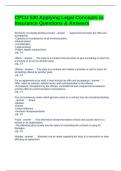Exam (elaborations)
CPCU 530 Applying Legal Concepts to Insurance Questions & Answers
- Course
- Institution
CPCU 530 Applying Legal Concepts to Insurance Questions & Answers Elements of a legally binding contract -Agreement (includes the offer and acceptance) -Capacity (or competence) of all involved parties -Mutual assent -Consideration -Legal purpose -Proper, legally required form -pg. 1.4 ...
[Show more]



